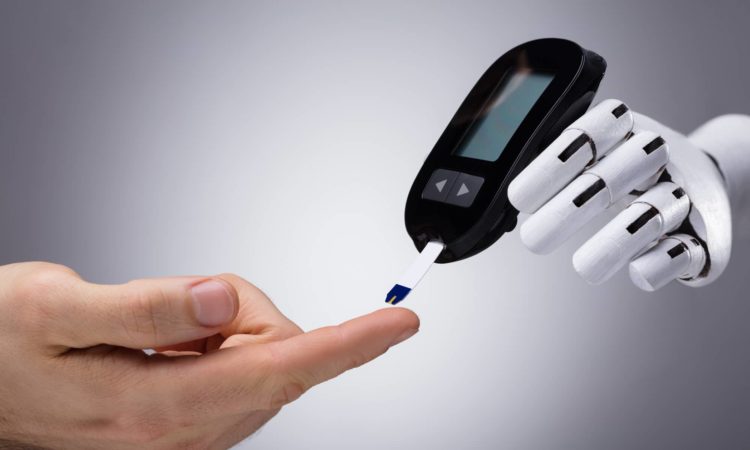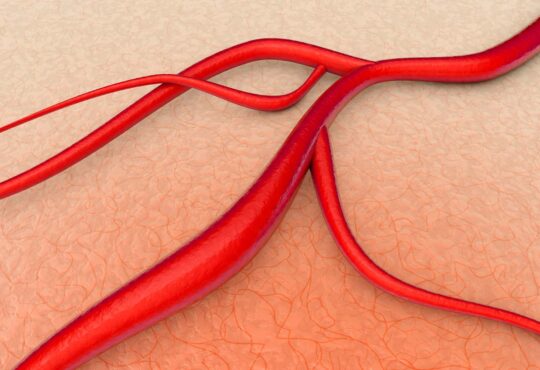
As medical science and research keep advancing, it’s also becoming more available to ordinary people – us, the patients – or consumers of the current “sick-care” system.
One sign of that is the availability of more tests so we can – by ourselves or in conjunction with our doctors – evaluate our own medical weaknesses and strengths.
Years ago, your annual physical consisted of the doctor listening to your heart and asking you how you felt. Blood tests were for people with actual symptoms.
Gradually, doctors are becoming more proactive, and so are many Americans.
We don’t want to wait for symptoms. We want to know where we stand now, so we can take steps to correct problems before we wind up in the hospital – or worse. (One-half of all first-time heart attacks are fatal.)
A Little-Known Heart Risk Factor
That’s the amount of plaque lining your veins and arteries.
Okay, everybody’s heard of plaque and how bad it is.
But how much do you actually have?
Plaque is the accumulated buildup of fats, cholesterol, fibrin, and the waste products of cells – all hardened by calcium.
It’s a known risk factor for stroke and heart disease. But – again – how much do you have?
Now You can take a Coronary Artery Calcium (CAC) Test to Find Out
It’s a form of CT scan that looks at the arteries going into your heart.
It does expose you to about as much radiation as a mammogram, so it’s not a test to take often. But it can help you and your doctor evaluate your risk for a heart attack.
If Your Score is:
0 – Congratulations, you have almost no risk
1-100 – low levels of arterial plaque, fairly low risk
101-300 – moderate amounts of arterial plaque, indicating high risk
Over 300 – you’re at great risk of heart attack
Doctors are supposed to combine this score with other factors such as your cholesterol, weight, and blood pressure to determine your risk and whether you should be medicated. If your score is over 100, they’ll probably want you on a statin drug.
Depending on your score, you may well decide to change your lifestyle, including diet and exercise.
One suggestion: Begin taking Vitamins K2-M4 and K2-M7. That helps remove calcium from your blood and deposit it into your teeth and bones. Whether it actually reverses current calcified plaque, is not yet proven, though.
What About a Blood Test for What Scares Us the Most?
Colonoscopies . . . mammograms . . . CT scans . . . biopsies – testing for cancer is far from simple or pleasant.
And we don’t have a way to screen for 80% of cancers, which is part of the reason why pancreatic and other cancers are so deadly. Those cancers cause over 70% of cancer deaths. If we could find them much earlier, we could treat them much more effectively.
It seems like every week I see a headline claiming a new blood test is going to detect cancer before the tumors are even visible. What’s up with that?
It’s coming.
Not many years ago, a division of Illumina was giving expectant mothers blood tests to detect Down’s Syndrome and other conditions. They spotted some strange results that had nothing to do with the fetus.
Subsequent investigation revealed all those mothers had previously undetected Stage Three or Stage Four cancer.
Illumina launched GRAIL, with a CEO who’d just lost his wife to colon cancer. They have developed a liquid biopsy. It’s Galleri, and it now claims to screen for 50 kinds of cancer.
Unfortunately, it’s not yet approved by the FDA, so it’s available only from the company’s clinical trials.
Other companies are working on similar technologies.
It’ll take time to convince doctors and insurance companies, but will eventually remove a lot of the fear around cancer.
Get an Accurate Measurement of Your Inflammation
Chronic inflammation is the silent trigger behind heart disease, cancer, and many other chronic diseases.
Right now, C-reactive protein (CRP) is the most common way to find out how bad your chronic inflammation is.
But we’re on the verge of much more advanced measurements – that can predict potential illnesses years in advance, including autoimmune diseases.
Edifice Health created a diagnostic test to measure your “inflammatory age” – iAge.
Edison used AI and machine learning to analyze the data from Stanford University’s 1,000 Immunosome Project, finding the significant blood biomarkers. They detected 7,500 proteins that are predictive and narrowed them down to five.
The iAge blood test should be available soon.
Of course, none of these tests are free. But most of them are reasonably priced for the average person. Your insurance company or Medicare may or may not cover them. Getting a doctor’s prescription first will help.
Also, it will benefit us all when doctors and insurers really can stress prevention rather than treatment. If we all got A1C, fasting blood sugar and glucose tolerance tests on a regular basis, that would cost FAR less money than waiting for full blown Type 2 diabetes – and then having to pay for that.
That’d be more like actual “healthcare” than “sickcare” – and cheaper.
It would lower treatment costs, reducing insurance and Medicare expenses, and so lower our premiums.
https://www.secondscount.org/heart-condition-centers/info-detail-2/what-is-arterial-plaque
https://www.cdc.gov/diabetes/basics/getting-tested.html
https://www.lifeextension.com/sales/lab-tests
https://www.heart.org/en/news/2018/11/13/coronary-calcium-test-could-help-clarify-heart-disease-risk-and-control-cholesterol
https://www.youtube.com/watch?v=zg1hg0nWBjs
https://www.barrons.com/articles/testing-new-cancer-screens-galleri-51650584753
https://www.amazon.com/Life-Force-Breakthroughs-Precision-Transform-ebook/dp/B09KY7ZXV6/







